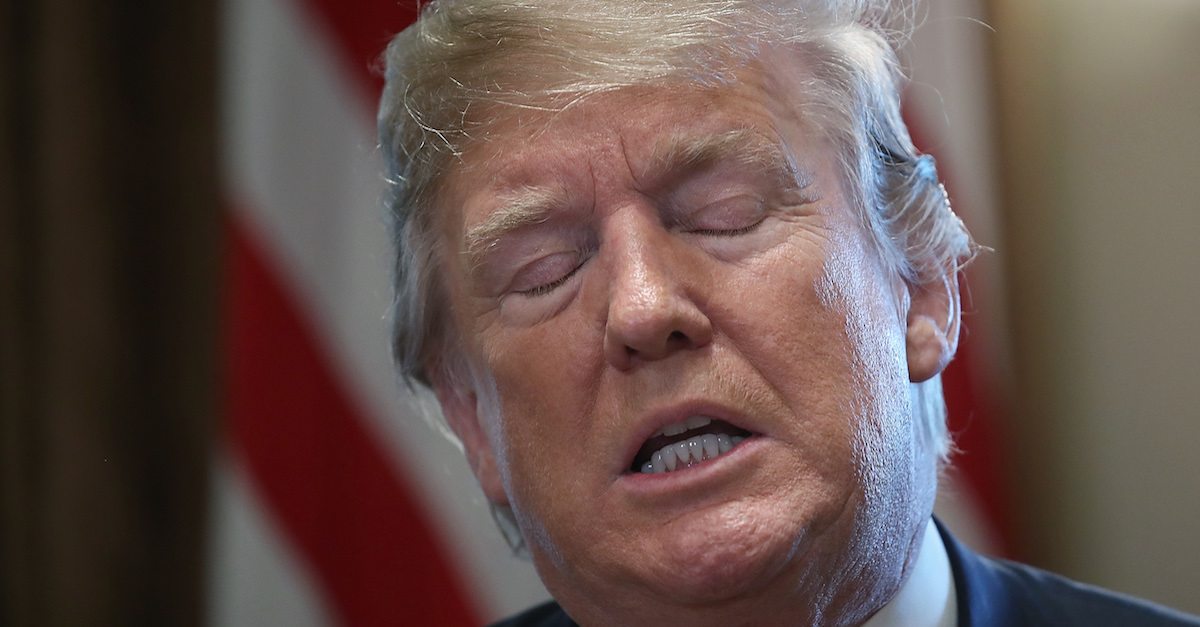
Before New York State Attorney General Eric Schneiderman became occupied with, umm, other matters, he had a pretty good plan to make sure that Donald Trump doesn’t get to benefit from his own pardon power. Last April, Schneiderman sent a letter to the governor and a group of legislators asking them to change New York state law so that any procedural hang-ups for federal prosecutions of Trump or Michael Cohen (or others) would not hinder corresponding state prosecutions. And although Schneiderman is out, neither New York State nor other left-leaning states are likely to forget the plan.
Under their state constitutions, New York State, as well as many others, guarantees its citizens even more protections against successive prosecution than the federal government does. That means that while under federal law, it’s perfectly fine for a person to be prosecuted in state court following a federal prosecution for the same crime – that kind of thing is a no-go in New York, except for in certain specifically-defined circumstances.
The concept underlying this issue is called dual sovereignty – the concept that American citizens are simultaneously citizens of the country and of their respective states, and that states have weighty authority all their own. The legislative change suggested by Schneiderman would add pardons to an existing list of exceptions to New York’s more general prohibition on double jeopardy.
Now, though, one Alabama robber with a broken tail light could throw a major wrench into any post-pardon plans to prosecute Trump or others in state court. On Thursday SCOTUS granted certiorari (agreed to hear) in the case of Gamble v. U.S.
Terance Martez Gamble was convicted of second-degree robbery in 2008. Seven years later, he was pulled over for a broken taillight, and when police searched his car, they found marijuana and a handgun. Gamble was convicted in Alabama of being a felon in possession of a firearm and served a one-year sentence. But that wasn’t all. During the Alabama prosecution, Gamble was also charged with the same crime, based on the same incident, under federal law. Gamble pleaded guilty to the federal charge, but reserved the right to raise double jeopardy as an issue on appeal. The federal conviction added 3 additional years to Gamble’s sentence, and now, the double jeopardy issue has made its way to the Supreme Court – where it has the potential to affect things far beyond Terance Gamble’s future.
The question presented in Gamble’s cert petition is powerful in its simplicity:
Whether the Court should overrule the “separate sovereigns” exception to the Double Jeopardy Clause.
This whole thing is a big deal for proponents of federalism. One only needs to go back to basically every GOP campaign speech, in which whoever is rallying votes hails the Tenth Amendment and “state sovereignty” as gospel sent down from on high. While a little inconsistency has never seemed to bother these politicians before, it’ll definitely be interesting to see how they rationalize the need to do away with their prized state sovereignty in this one slice of jurisprudence where it helps Donald Trump.
Of course, irrespective of any changes to double jeopardy law, New York could still prosecute Trump and others for crimes not charged by the feds. Robert Mueller may well have used their discretion to quarantine certain avenues of prosecution for the sheer purpose of preserving those cases for state prosecutors. We’ll just have to wait and see on that front.
SCOTUS, now Kennedy-less, will have an interesting opportunity in the Gamble case. Liberal-leaning justices are known take active hands in correcting systemic unfairness when it comes to criminal procedure – and this case certainly seems to present such an opportunity. But the case’s outcome has potential to eliminate a potentially powerful tool against a different kind of injustice. A ruling in Terance Gamble’s favor might eradicate New York State’s prized chance to position itself to defend the realm against Donald Trump and Michael Cohen.
Given that state sovereignty is a bedrock conservative value, one wonders whether nominees’ views on dual sovereignty might factor in to Trump’s SCOTUS pick as Kennedy’s replacement. If it does, the issue might operate as a kind of poison pill; any justice that is flexible with regard to state sovereignty would likely carry that attitude forward on other matters of state versus federal law. Looking at you here, abortion, religious-freedom, and anti-discrimination laws.
[(Photo by Win McNamee/Getty Images)]
This is an opinion piece. The views expressed in this article are those of just the author.